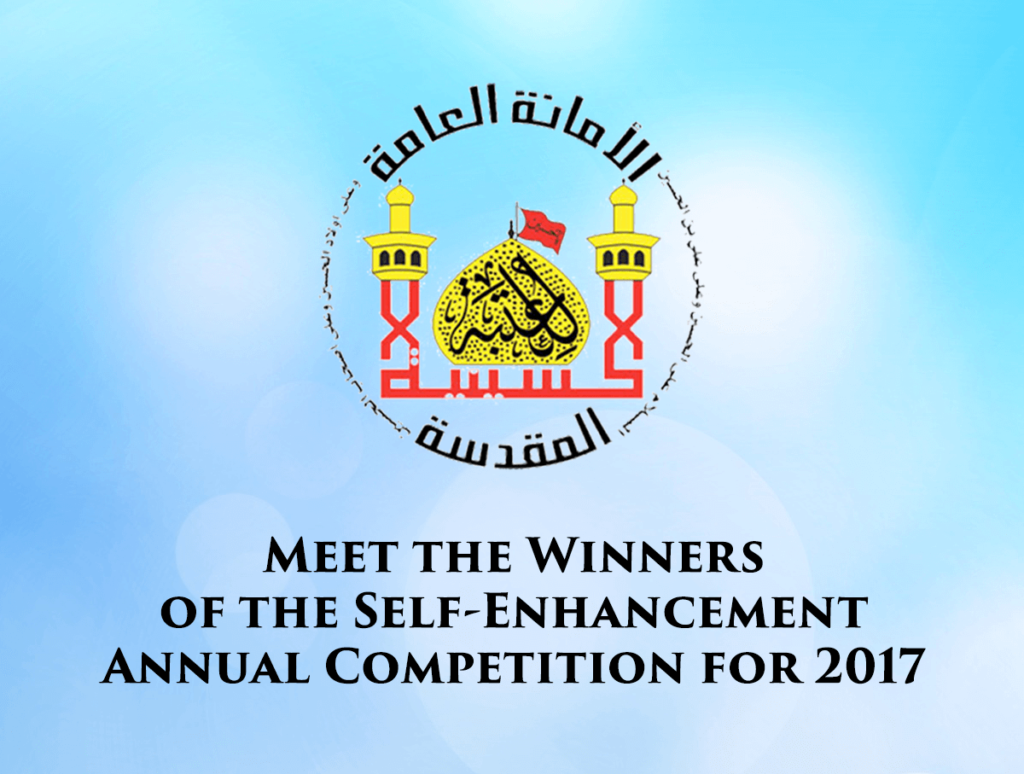Meet the Self-Enhancement Competition Winners
During the holy month of Ramadhan, 2017, I.M.A.M. held its second annual Self-Enhancement Competition. This year’s competition was a Quranic Recitation Competition for both male and female participants, in the US and Canada, between the ages of twelve and twenty-six. Each participant had to record and submit a predetermined selection of verses from the Holy Quran, using the tartil method with emphasis on correct pronunciation. The recitation portion of the competition was based on pronunciation guidelines according to “Tajwid: A Guide to Quranic Recitation.”
Out of the many qualified entries that I.M.A.M. received, we selected only the top three scores, of both male and female contestants, as winners. The top prize for this year’s competition is a spiritual journey to visit the holy sites in Iraq with the full package and round-trip ticket paid for by I.M.A.M.
Our first prize winners both come from Detroit, Michigan, namely Br. Ali Jomaa, 21, and Sr. Zahra al-Ammoury, 17. Our second-place winners are Br. Shayan Doroudi, 26, of Pennsylvania, and Sr. Amena Syed, 15, of Waterloo, Canada. And our third-place winners are Br. Ali Hussain, 16, of New York, and Sr. Manal Saad, 23, of California, who unfortunately was unable to make this trip this year. This group of five youth, along with their pre-approved guests, will be embarking on their trip to the holy sites of Iraq in the coming week over the winter holiday.
The purpose of the competition was to encourage the love of reciting the Holy Quran in our youth throughout North America. The prize also was meant to keep our youth connected with the love of our Ahl al-Bayt (pbut), as well as increase the winners’ spirituality and faith. With that in mind, I.M.A.M. asked each of the five participants a little about themselves, how they came to recite the Quran, and what advice they may have for other youth. In the following days we will be featuring all five winners to get better insight into their relationship with the Quran as youth and how we can encourage other youth to also further their connection with the Quran.
We begin with our first-place winners, Zahra al-Ammoury and Ali Jomaa
Zahra al-Ammoury, 17- Detroit, MI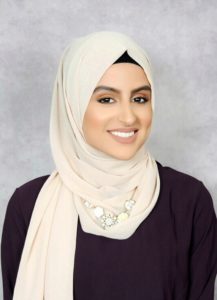
Q: Tell us a little about yourself. Where did you grow up, what grade are you in, and what are some of your hobbies?
A: I grew up in Detroit, Michigan.
I am in the 12th grade and my hobbies are drawing, writing, photography,
reading, and gardening.
Q: When did you start learning to read the Quran? Who was your teacher and how often did you have lessons?
A: I started learning to read the Quran when I was in the first grade, my teacher was my mother [and] we would go from five verses each day, to completing the whole Quran. As my reading excelled, I would read for at least 5 hours and listen to Abdulbasit Abdulsamad.
Q: How did you hear about the Self-Enhancement Competition and what made you register? Did you think you had a chance to win?
A: A link was sent to me about this competition, I decided to give it a try, because I love [the] Quran and this opportunity. I had no idea that I was going to win, but I had hope.
Q: What are you looking forward to on your trip to Iraq?
A: The number one thing (my wish) that I’m looking forward to on this trip is visiting the holy shrines.
Q: How has reading the Quran affected your life? What advice could you give to other youth in their relationship with the Quran?
A: Reading [the] Quran has changed my life completely. It reformed my life and it made me what I am today. It’s a comforter when I’m lonely, [gives] happiness, a supporter when I’m in need, and a guide to my personal and social life.
Likewise, advice I would give to others for their relationship with the Quran is to start reading little by little, then you’ll get better and more attached. Lastly don’t just read, listen too.
Ali Jomaa, 21- Detroit, MI 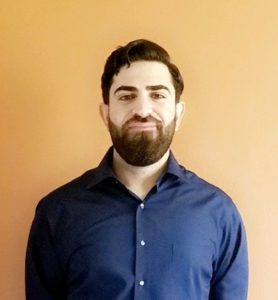
Q: Tell us a little about yourself. Where did you grow up, what grade are you in, and what are some of your hobbies?
A: I grew up in the Dearborn community all of my life. I’m a college student and will be attending nursing school soon. Some hobbies that I enjoy are going on walks with reflection, reciting, and reading.
Q: When did you start learning to read the Quran? Who was your teacher and how often did you have lessons?
A: I starting learning how to read [the] Quran when I was still a high school student. I was introduced to an amazing man that became a dear friend that helped teach and practice with some friends and [me] on a weekly basis, and that helped set the base for Quran reading for me.
Q: How did you hear about the Self-Enhancement Competition and what made you register? Did you think you had a chance to win?
A: I actually almost forgot to enter the competition this year until a friend sent me a link for entry. Alhamdulillah that I ended up entering before it was too late. I joined the SEC competition last year with questions related to the book, “God’s Emissaries”. I made it to the final round but didn’t place. I wanted to try again the next year and when I saw that it was Quranic [tartil], I was interested to see what had to be read and saw a good opportunity. I did not know if I would be able to win but I was hoping that I would be able to place. So, I gave it another try this year. After practicing numerous times, I finally had one recording that I felt was good, so I chose to submit it. One never knows how God will provide for them through His ways.
Q: How has reading the Quran affected your life? What advice could you give to other youth in their relationship with the Quran?
A:[The] Quran has helped in the soothing of my heart and bringing pleasure in the recitation of it. As I need this advice for myself first and foremost, I would tell the youth not to take this Divine book for granted. Build a relationship with it early and try and read it daily. Try very hard to learn how to read it properly in Arabic, and reflect on the reading that you do.
Think about the verses you come across, and try not to read it only for the sake of reading, but dig deeper into its secrets as well. It will reform ourselves and lives. The same way that one needs food every day for the body to function properly and be healthy, [the] Quran is a food and medicine for the soul that will have unimaginable benefits for the human.
Meet our Second Place Winners: Amena Syed and Shayan Doroudi
Amena Syed, 15- Waterloo, Canada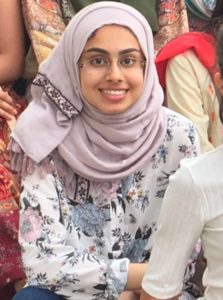
Q: Tell us a little about yourself. Where did you grow up, what grade are you in, and what are some of your hobbies?
A: I’m 15 years old, in the 10th grade, and grew up in Waterloo, Canada. I have a younger brother and sister. Some of my hobbies include reading, baking, knitting, and playing tennis. I enjoy my math and science and would like to eventually study medicine like my father and grandfather.
Q: When did you start learning to read the Quran? Who was your teacher and how often did you have lessons?
A: I started reading the Holy Quran around the age of five or six with a private Quran tutor two times a week and also at Sunday School. I continued to read even after I completed the Quran.
Q: How did you hear about the Self-Enhancement Competition and what made you register? Did you think you had a chance to win?
A: My aunt in the US, who had enrolled for the Self-Enhancement Competition last year, suggested that I enter. I didn’t think I would win but I didn’t have anything to lose.
Q: How has reading the Quran affected your life? What advice could you give to other youth in their relationship with the Quran?
A: [The] Quran became a daily part of my life, and if I don’t read it, I feel like something is missing. I also read the translation so I can understand the meaning. Overall, reading the Quran gives me a feeling peace.
My advice would be to practice. Also, not to just forget about the Quran after you have completed reading it. Make it a habit to read the Quran on a regular basis, after salah for example. You will not make it a priority if you don’t set aside time for it.
Shayan Doroudi, 26 – Pennsylvania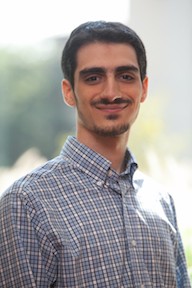
Q: Tell us a little about yourself. Where did you grow up, what grade are you in, and what are some of your hobbies?
A: I was born and raised in Mission Viejo, California. I am a fifth year PhD student at Carnegie Mellon University, studying computer science with a focus on educational technology. I enjoy playing board games and finding new halal places to eat.
Q: When did you start learning to read the Quran? Who was your teacher and how often did you have lessons?
A: I started learning to read the Quran at a young age at a local Saturday school, where we were taught by Haj Samir Amiri. Through him, I learned a lot of the basic rules of recitation, and I just practiced what I knew until a few years ago. I was always interested in reciting the Quran and would often listen to different reciters. But until a few years ago, I could not recite fluently, and I remember feeling too shy to recite in Quran circles, where my elders could recite much faster. But a few years ago, I started to invest more time to properly learn the rules of tajwid. I started listening to YouTube videos of Haj Maytham al-Tammar explaining the rules of recitation, where I started to see how much I had not previously learned! Around that time, I also acquired the Tajwid book by Shaykh Rizwan Arastu, which also helped me learn and solidify my grasp of some of the rules. I then had a couple of other teachers for short periods of time. Most recently, my wife’s uncle, Ali Mazloum, taught me remotely from Lebanon for a few weeks. He helped me become a more fluid and careful reciter and he was able to catch my mistakes even through poor Internet connections! I do not know exactly when I became considerably more fluent in reciting, but with all of these resources, lots of practice, and tawfiq (success) from Allah (swt), it came together alhamdulillah (All praise is to God).
Q. How did you hear about the Self-Enhancement Competition and what made you register? Did you think you had a chance to win?
A: I receive emails from I.M.A.M. which is how I learned about the Self-Enhancement Competition. I decided to participate because I enjoy reciting the Quran, I had been practicing the rules of tajwid, and if I was fortunate enough to win, ziyarah is a wonderful gift. I thought I would have a chance to win, depending on who else was participating, but I did not think it was guaranteed. I did put in a lot of practice (perhaps daily during the first two weeks of the month of Ramadhan), and that is probably what helped me get second place. Putting in the practice was not just for winning; it gave me the ability to repeatedly connect with a few ayat of the Quran for two weeks and to look for measurable improvements in my ability to recite those ayat. I believe that is the goal of the Self-Enhancement Competition. And for that reason, I encourage all the youth to participate, even if they do not think they have a chance of winning. The prize of the competition is also completely in line with the goal because it gives an additional opportunity for the winners to spiritually enhance themselves further. But even without winning, the competition is more than just a competition; it is an opportunity for spiritual growth!
Q: How has reading the Quran affected your life? What advice could you give to other youth in their relationship with the Quran?
A: I think many people deemphasize learning to recite the Quran because they believe we should prioritize other matters more, such as understanding and acting upon the meaning of the Quran. But I believe these different goals are complementary, not mutually exclusive. Reciting the Quran is only a means to acting upon it, which should be our ultimate goal, but it is a beautiful means that we should all pursue (among other means).
Reciting the Quran and benefiting from its teachings are interrelated. If I want to practice reciting the Quran, it is also an opportunity for me to listen to the signs of the Creator. If I open the Quran to learn and seek advice, it also gives me a chance to practice reciting. If I recite the Quran and read its translation, my understanding of the meaning of the Quran and Arabic will naturally improve. If I stumble upon the inability to recite something, it gives me the opportunity to learn something new. And as I learn more through the Quran, lectures, readings, and my day-to-day experiences, I find it amazing how I can return to a part of the Quran that I have read before, but find in it new meanings and new ways in which I can relate it to my life. Reciting the Quran is a means towards lifelong learning.

